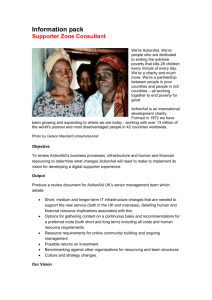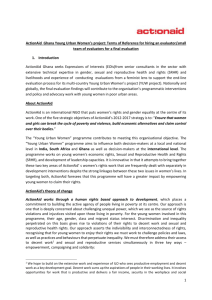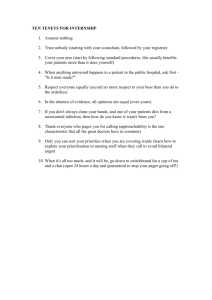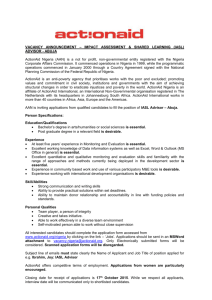DOCX
advertisement
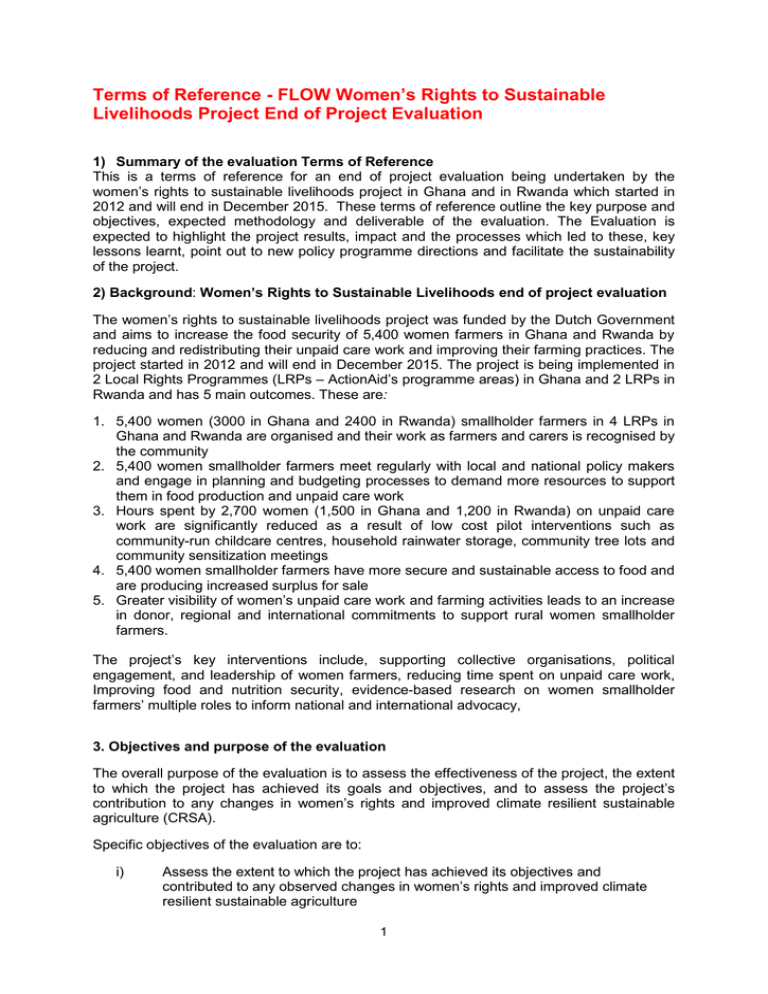
Terms of Reference - FLOW Women’s Rights to Sustainable Livelihoods Project End of Project Evaluation 1) Summary of the evaluation Terms of Reference This is a terms of reference for an end of project evaluation being undertaken by the women’s rights to sustainable livelihoods project in Ghana and in Rwanda which started in 2012 and will end in December 2015. These terms of reference outline the key purpose and objectives, expected methodology and deliverable of the evaluation. The Evaluation is expected to highlight the project results, impact and the processes which led to these, key lessons learnt, point out to new policy programme directions and facilitate the sustainability of the project. 2) Background: Women’s Rights to Sustainable Livelihoods end of project evaluation The women’s rights to sustainable livelihoods project was funded by the Dutch Government and aims to increase the food security of 5,400 women farmers in Ghana and Rwanda by reducing and redistributing their unpaid care work and improving their farming practices. The project started in 2012 and will end in December 2015. The project is being implemented in 2 Local Rights Programmes (LRPs – ActionAid’s programme areas) in Ghana and 2 LRPs in Rwanda and has 5 main outcomes. These are: 1. 5,400 women (3000 in Ghana and 2400 in Rwanda) smallholder farmers in 4 LRPs in Ghana and Rwanda are organised and their work as farmers and carers is recognised by the community 2. 5,400 women smallholder farmers meet regularly with local and national policy makers and engage in planning and budgeting processes to demand more resources to support them in food production and unpaid care work 3. Hours spent by 2,700 women (1,500 in Ghana and 1,200 in Rwanda) on unpaid care work are significantly reduced as a result of low cost pilot interventions such as community-run childcare centres, household rainwater storage, community tree lots and community sensitization meetings 4. 5,400 women smallholder farmers have more secure and sustainable access to food and are producing increased surplus for sale 5. Greater visibility of women’s unpaid care work and farming activities leads to an increase in donor, regional and international commitments to support rural women smallholder farmers. The project’s key interventions include, supporting collective organisations, political engagement, and leadership of women farmers, reducing time spent on unpaid care work, Improving food and nutrition security, evidence-based research on women smallholder farmers’ multiple roles to inform national and international advocacy, 3. Objectives and purpose of the evaluation The overall purpose of the evaluation is to assess the effectiveness of the project, the extent to which the project has achieved its goals and objectives, and to assess the project’s contribution to any changes in women’s rights and improved climate resilient sustainable agriculture (CRSA). Specific objectives of the evaluation are to: i) Assess the extent to which the project has achieved its objectives and contributed to any observed changes in women’s rights and improved climate resilient sustainable agriculture 1 ii) iii) iv) v) vi) Assess the process of change by which project objectives have been achieved (or not) and the relative effectiveness of specific intervention strategies (relating to unpaid care work initiatives, the use of time diaries, CRSA, etc.) To assess the extent to which the project was implemented: a. in line with ActionAid’s HRBA Principles (particularly with regards to women’s rights, accountability to people living in poverty, and power dynamics), and; b. in terms of the efficient use of resources in relation to the planned activities, outputs and outcomes. To identify and document lessons learnt and good practices which can inform future programming and wider organisational learning on unpaid care work, climate resilient sustainable agriculture and women’s rights Make specific, actionable recommendations for up-scaling and replication of project interventions and policy directions on unpaid care work and CRSA approaches based on an understanding of how the project has or has not worked in different contexts and what were the enabling factors and barriers to change Use the (draft) ActionAid International Evaluation Principles and Quality Standards and technical guidance for the evaluation and to make recommendations for their improvement. 4.0 Key evaluation questions to be answered In fulfilling the aims and objectives of this ToR, the evaluation is also expected to address and answer the following evaluation questions related to the effectiveness of the project in each country: 1. How have women and men perceived and engaged with community groups, the use of REFLECT methodologies, and time diaries? How have different power dynamics shaped women’s engagement and have there been any unintended consequences, positive or negative? 2. If and how has women’s participation in leadership and decision making changed within communities and in engagements with local and national duty-bearers? 3. What have been the most effective strategies for engaging men in the project and have they led to a change in household division of labour? 4. What has been the relative success of the different pilot interventions in each country (such as community-run childcare centres, household rainwater storage, and community tree lots for firewood) on women’s time use and what trade-offs women have made with each? 5. Have climate resilient sustainable agriculture (CRSA) methods (such as use of green manure, composting, terracing, multi-purpose trees, intercropping, mulching, , community seed control- seed preservation, sustainable water management, livelihood diversification etc.) had any impact on agricultural productivity, income or food security, and why or why not? 6. If and how different components of the project (specifically relating to unpaid care work and CRSA) have combined to lead to women’s economic empowerment, and how could the conceptual theory underpinning the project be improved? In addition, the following secondary questions relate to the implementation of the project: 1. If and how women’s needs and viewpoints shaped the programme design and its implementation? 2. What was the quality of the partnerships involved in implementing the project? 3. Have the time diaries and other M&E processes and data provided evidence of sufficient quality to use for international advocacy efforts? 2 5.0 Use and users of the evaluation The evaluation is expected to take an ‘utilisation-focused’ approach. The primary intended users are: User Use of the evaluation AAI Ghana and Rwanda quality management and monitoring and evaluation officers, International Secretariat projects and other AAI project and senior managers in countries where CRSA and unpaid care work is a priority The results of the evaluation will be used to identify the key opportunities for up scaling, replication of the project and inform future direction of similar projects on women empowerment. The evaluation will be used to identify the key lessons learnt regards women’s empowerment, food security, unpaid care work, climate resilient sustainable agriculture, processes of advocacy, monitoring, evaluation, connecting local to regional initiatives and share them widely across the Action Aid Federation and with key partners. Example involvement/ role the evaluation process in Developing Terms of Reference for the evaluation Briefing selected evaluator on the project Interviewed by the evaluator as key informants Providing logistical and coordination support to the evaluator as agreed Writing a management response to the evaluation Disseminating the evaluation internally and externally The evaluation will generate useful information in relation to climate resilient sustainable agriculture practices which fit well with ActionAid’s strategic goals on women empowerment, economic alternatives and climate resilient sustainable agriculture. AAR partners, Faith Victory Association, Réseau des femmes and AAG partners, Songtaba, Bonatadu and Widows and Orphans Movement The results of the evaluation will be used to identify the key opportunities for up scaling, replication of the project, internal linkage of the project with existing projects and inform future direction of similar projects on women empowerment by the partner. The evaluation will be used to identify the key lessons learnt regards women’s empowerment, food security, unpaid care work, climate resilient sustainable agriculture, processes of advocacy, monitoring, evaluation, connecting local to regional initiatives The evaluation will generate information regards partner capacity development needs and recommendations on successful 3 The partners will feed into the TOR, and provide logistical support to local and international researchers in carrying out the evaluation, Partners will support where possible in data analysis and reporting on the evaluation Women farmers smallholder Communities in Ghana and Rwanda Dutch Ministry of Foreign Affairs project handover The evaluation will be used by women smallholder farmers to identify their key next steps regards advocacy on climate resilient sustainable agriculture and addressing unpaid care work and other key issues emerging from the project The evaluation will be used by communities to discuss challenges and lessons and inform future engagement with local and national government by communities on projects. The evaluation will be used by communities to reflect on the project impact regards what worked well as well as project handover processes. The evaluation report will be used as part of the monitoring and evaluation of the FLOW grant which ends in 2015 Active participants in evaluation data gathering exercises, providing their opinions and feedback on the project and reflections on if/how it has affected them Evaluator to provide a summary of their take away messages before leaving each community, to be commented on and validated by women Selected participants in evaluation data gathering exercises, providing their opinions and feedback on the project and reflections on if/how it has affected them. the community members will include traditional and religious, government community leaders and local authorities Evaluation report to be shared with the Dutch Ministry of Foreign Affairs 6.0 Scope of the evaluation In terms of outcome 1- 4 of the project, the evaluation will take place in the Southern Region of Rwanda in Nyanza and Gisagara Districts and in Ghana it will take place in Nanumba and Talensi/Nabdam in Ghana. The evaluation will involve consultative process with direct and indirect beneficiaries of the project. These will include women smallholder farmers, local leaders, local government authorities from the Ministry of Gender and Family Promotion, Ministry of Agriculture and Animal resources in Rwanda and the Ministry of Food and Agriculture, gender and women’s affairs, traditional leaders in Ghana. Ghana In Ghana the project is being done in 2 Local Rights Programmes (LRPS – ActionAid’s geographic area of operation) Talensi/Nabdam LRP is located in the Upper East Region, the second poorest region in Ghana. Nanumba LRP is located in the Northern Region of Ghana and it is the third poorest region in the country. There are 42 women’s groups in Talensi/ Nabdam. There are 58 women’s groups in Nanumba Rwanda In Nyanza LRP covers Nyanza district located in southern Rwanda which was deeply affected by the 1994 genocide and Gisagara LRP is the district neighbouring Nyanza and Burundi. It is an area that has suffered from food insecurity and high poverty levels. There are 40 women’s groups in each of the two LRPs . There are sectors in each LRP. 4 In terms of the outcome 5 of the project the evaluation will include telephone/skype interviews with members of the African Union Department of Agriculture and Rural Economy, NEPAD/ CAADP and members of UNEP, UN Women, as well as representatives from Groots, FEMNET, Acord, SID, and Daughter of Mumbi Global Resource Center 7.0 Expected methodology / Approach to the evaluation The consultant is expected to use a variety of methods to collect and analyse data and bring out a clear gender analysis throughout the evaluation. The consultant is also expected to refer to tools used by ActionAid in the mid- term evaluation to ensure comparability of data over the time frame of the project. We welcome suggestions for methodological approaches that address the objectives and evaluation questions set out in this ToR that include strong gender-responsive or feminist evaluation principles, but as a guide we expect this may include the following tasks from the consultant: Inception Phase to include: a) Introductory briefings with ActionAid project team and technical advisors within ActionAid International, ActionAid Ghana and ActionAid Rwanda b) Literature review of existing project and contextual documents Including but not limited to: The FLOW women’s rights to sustainable livelihoods Project Proposal, FLOW monitoring protocol, Baseline Survey report for AAR and AAG and consolidated baseline report 2012, 2013, 2014, FLOW annual reports, work plans and budget Climate resilient sustainable agriculture toolkit Delivering women farmers rights policy brief workshop reports and field visit reports Annual review meeting reports FLOW M and E tools used in annual reporting for 2015 Identification and review of secondary data particularly to use as comparison data and for triangulation c) Detailed methodology, data collection tools, work plan Including but not limited to: Reviewing existing data collection tools to identify key indicators (within the project log frame or not) for which comparable data is available (from baseline, mid-term and monitoring tools) and that can be used to demonstrate changes over time Finalise and agree overall methodological design and approach for the evaluation, including details of sampling strategy and size and analytical framework Finalise management and coordination arrangements for the evaluation in all countries/internationally Adapt/develop specific data collection tools or processes (i.e. focus group discussion guides etc.) Develop clear and simple ethical protocol and guidelines for the evaluation Data collection phase to include: Including but not limited to: d) Field visits and community discussions 5 The consultant will conduct field visits and hold community discussions in areas where the project is being implemented Data collection (qualitative and quantitative) from a sample of women in Ghana and Rwanda reflective of the following groups: women who have benefitted from child care centres, seed and grain banks, climate resilient sustainable agriculture and food processing, training on leadership and engagement with local authorities Data collection (qualitative and quantitative) from men and other community members directly or indirectly involved in the project (and possibly community members not involved in the project by way of comparison) and local authorities (traditional and elected) e) Interviews and focus group discussions with AAR, AAG, and partner staff, AAI IS advocacy and resilient livelihoods team, local authorities (traditional and elected) and local development institutions, Government, Ministries and Parliamentarians, traditional leaders and other key actors. f) Key informant interviews (remotely or in person) with the following: Local government authorities in the selected areas of the study National level officials in each country Civic organisation including farmers network and women’s organisation in each country Representatives from AU and NEPAD/CAADP Representative from UNEP and UN Women Civil society organisations on regional advocacy g) Statistical analysis of Time diaries, the consultant is expected to review the time diaries reports being collected in the two countries and ascertain the overall impact of the project on women’s time use. The consultant is expected to develop an analytical framework through which to organise data and address the evaluation questions as above. Further, in analysing data, the consultant will be expected to highlight the perspectives of different stakeholders, and different understandings of if, how, and for who change has occurred. The analysis should draw on and make comparisons to existing data sources (baseline, mid-term and monitoring data etc.) and if and where possible use secondary data to compare project level changes with non-project level changes or use other evaluative approaches to assess the project’s contribution to change (as in objective 1). ActionAid expects all evaluations to be carried out in line with AA Evaluation Standards. These standards will be shared on request, but in practical terms include the need for the evaluation and the evaluator to: Feeding back: the evaluators should as a minimum commit to feeding key findings back to the communities involved in the evaluation before leaving ‘the field’. Options for validation of results and feeding back final evaluation findings must be considered. Transparency and ethical standards: the evaluators should explain clearly to communities involved in the evaluation what the purpose of the exercise is, how people’s information will be used. The evaluation should follow ActionAid’s ethical standards for research and data collection, and should include a risk assessment covering security risks to communities. As a minimum the evaluation should ‘do no harm’. Community voices: it is essential that the evaluation reflects the voices of women and men involved in the project. People should be consulted as part of the evaluation, and their voices should be included in the evaluation report as direct quotes and case 6 studies. In line with ActionAid’s mandate the evaluation should prioritise people living in poverty and exclusion, especially women. Women’s rights: Women’s rights must be respected in all evaluations. All evaluations should seek to explore how women have been affected by an intervention and the effect of the intervention on gender relations. It is essential that women’s voices are heard clearly in the evaluation. The timing and location of evaluation activities and the composition of the evaluation team should be designed to maximise women’s ability to participate in the evaluation. Transparency about methodology: The evaluation should include a detailed and transparent discussion of the methodology used and key decisions taken in designing and implementing the evaluation. This should include information about the sampling (approach to sampling, numbers of people/communities covered, to what extent it was representative), what tools were used and why, methodological limitations and gaps in the evaluation. Disaggregated data: All data, qualitative and quantitative, collected through the review must be disaggregated by sex and age as a minimum. Further disaggregation according to relevant areas of social exclusion to be conducted where possible. 8.0 Coordination, roles and responsibilities for implementing the evaluation ActionAid International is looking for an evaluation consultant(s) to lead the evaluation of the multi-county project. This lead evaluator will develop the methodology and tools for the project evaluation in all countries, in consultation with countries. The lead evaluator will be directly involved in the management and execution of the evaluation in at least one of the two project countries. Details will depend on the location of the selected lead consultant (and applications from consultants based in any country are eligible) and their proposed methodology, work-plan and budget. In the case that the lead consultant is not based in Ghana or Rwanda, it is suggested that the lead consultant conduct the evaluation directly in Rwanda, and indirectly support a national-level consultant to be recruited in Ghana (herein referred to as the national consultant). In this case, the terms of reference of the national consultant shall be discussed and agreed upon by the lead consultant and ActionAid Ghana. ActionAid Ghana would be responsible for hiring the national consultant and payment of the national consultant, and the national consultant would conduct the evaluation using the methodology and tools discussed and agreed with the lead consultant. The national consultant will be expected to respond to any queries, clarifications and details required by the lead consultant before and during the evaluation. The lead evaluator will be responsible for data quality from all countries, and for developing methodology, consolidating all data collected, analysing it, and producing a final evaluation report. The lead consultant would ideally still visit Ghana to support the national consultant, but may not need to be involved in all data collection. The lead evaluation consultant will report to AA International Secretariat (AAIS) and will be supported by the international project manager from the ActionAid International Secretariat, based in Zimbabwe. AAI IS will lead coordination of the evaluation across the two countries, and will provide all necessary project information; introductions to relevant stakeholders at the international level; and any general logistical support and advice. AA Ghana will lead the coordination of the evaluation in Ghana with the support of its three partners. AA Rwanda will lead the coordination of the evaluation in Rwanda with the support 7 of its two partners. In both countries, this will involve: introductory briefings with the consultant(s); logistical support arranging visas and booking accommodation as required; providing contact details and introductions to key stakeholders; mobilising community members to be involved in the evaluation; if required, recommendations for research assistants, interpreters or other local human resources as needed. The selected lead evaluation consultant(s) may also be requested to work with a member of ActionAid International’s EAGLEs (Evaluation and Accountability Global Leaders) network. During the inception phase, the possibility of an EAGLEs member being involved in some part of the evaluation may be explored (depending on availability and timing). This would be to provide the EAGLEs member with a learning opportunity through accompanying the evaluation process, and to contribute their own knowledge of ActionAid and technical expertise in evaluations. The involvement of the EAGLEs member would be funded separately by ActionAid. The decision to involve EAGLEs would be at the discretion of the lead evaluator and would in no way affect the independence of the lead evaluator. 9.0 Outputs / deliverables of the evaluation 1. An inception report from the evaluator with detailed methodology, tools and work plan 2. A draft evaluation report to be produced by external evaluator 3. Final evaluation report that incorporates feedback received from ActionAid and meets agreed quality standards and evaluator. The report (not more than 50 pages excluding annexes) should be very precise, must answer each evaluation objectives and should at least contain the following (this can be discussed within the inception phase): a. Cover page (title of the evaluation report, date, name of consultants) b. Contents table c. Executive summary of no more than 2 pages outlining the key purpose of the evaluation, main points of analysis, key findings, conclusions and recommendations d. Introduction outlining the background to the project and the evaluation e. Purpose and objectives of the evaluation f. Analytical framework of the evaluation g. Methodology/approach, indicators used, ethical issues and limitations of the evaluation h. Summary results against project log-frame indicators i. Major findings (data analysis, including gender analysis and response to evaluation questions) j. Lessons learned and recommendations k. Annexes: details of data collection tools, schedule of field visits and meetings; list of people interviewed; bibliography of key documents consulted; TOR for the evaluation l. Annexes may also include more detailed country-level reports or case studies (exact format to be agreed during inception phase) 4. The evaluation team is required to make a presentation of key findings to ActionAid (possibly remotely) 5. Recommendations following on from key findings of the evaluation are to be discussed, and possibly ‘co-created’ with ActionAid and partner staff to encourage relevance, ownership and action of recommendations 6. Draft summary report (summarising key findings and recommendations, up to 4 pages) that can be used to disseminate findings, written in English but in clear and plain language and style suitable for project communities 8 7. The raw data (all transcripts, quantitative data, and data collection tools) must be handed over to ActionAid together with the evaluation report. 8. A short (maximum two page) report providing feedback to ActionAid International on the draft Evaluation Principles and Standards (their applicability and usability) Management Response: The report will be followed by a management response from ActionAid, outlining areas that we agree with and will take forward in future responses; responding to areas highlighted as requiring improvement; outlining any findings that we disagree with which have not been resolved through providing comments on the draft report, and indicating how learning will be taken on board in this and future responses. 10.0 Expected timetable for the evaluation The consultancy will be required to start in early September, and will be completed no later than the end of November. The table below gives suggested, approximate timeline for planning purposes only. A detailed work plan will be finalised and agreed during the inception phase. Activity Approximate Tentative Number of days dates (for planning only) Discussion and interpretation of TOR with 1 5th October consultants 2015 Potentially participate in project workshop (a project 3 19-23 October workshop is being held in Nairobi. This may present 2015 an opportunity for the lead consultant to meet and discuss with key members of the project team from both countries, but this is optional and will depend on final timings) Literature review 2 End of October 2015 Preparation of data collection tools and submission 2 of inception report 12 - 18 Data collection in field mid November 2015 Data analysis and 6 19st November preparation of draft report 2015 Online discussion of draft report and sending 21stNovember comments to consultant (ActionAid) 2015 Finalisation of country level report 4 By 31st November 2015 Consolidation of global draft reports first draft 4 5th December 2015 9 Finalisation of report 2 Production of evaluation summary for feedback to 2 beneficiary communities Feedback on the (draft) ActionAid International 1 Evaluation Principles and Quality Standards and technical guidance 11.0 18th December 2015 End December 2015 End-December 2015 Budget The total indicative budget available for the evaluation is £23,000 (including all applicable taxes), which should cover all costs including consultants’ fee for conducting the entire assignment (including travel, daily allowances and out-of-pocket expenses, and all in-country data collection costs). This includes all costs associated with the evaluation in Ghana. However, if a national level consultant is to be recruited separately in Ghana (see section 8 above) then the costs of this (consultancy fees and all data collection costs) would be deducted from the total available, and the approximate amount available for the lead consultant would be £16,500. 12.0 Evaluation team qualifications and how they should apply Selection Criteria ActionAid is seeking proposals from individuals or teams with the following skills and experiences: 1. Demonstrable expertise on women’s rights and gender equality programmes and in human rights based approaches 2. Understanding of rural livelihoods and climate change adaptation programmes, particularly in Ghana, Rwanda or the region, would be preferable 3. Substantial evaluation experience including experience in conducting feminist and/or gender-responsive evaluations 4. Previous experience working with communities using participatory approaches 5. Substantial experience conducting qualitative research and data analysis 6. Ability to conduct statistical analysis of monitoring and survey data 7. Demonstrated understanding of and commitment to ethical issues in research/evaluations 8. Experience in managing and coordinating evaluation/research exercises, including with or through country-based partners, delivering agreed outputs on time and on budget 9. Ability to write high quality, clear, concise reports in English Selected consultant(s) will be expected to sign and abide by ActionAid values and key policies (including Anti-Sexual Harassment Policy, Child Protection Policy etc.). How to apply We invite interested individuals to submit the following application documents: A. Copy of CV of the consultant(s) who will undertake the research and evaluation (maximum 3 sides of A4 each); B. Proposal (maximum 8 sides of A4) detailing a) how the Consultant(s) meets the selection criteria and b) their understanding of the TOR and methodology. Please ensure your proposal explicitly answers the following questions: 10 i. C. D. E. F. What will you do to successfully engage with the intended users as identified in this ToR? ii. What evaluation approach and methods do you suggest to answer the evaluation questions given in the ToR? iii. How will your proposed approach involve women participating in the project in the two countries? iv. What do you foresee to be the main ethical issues and what will be your approach to addressing them? v. What risks do you foresee in relation to this evaluation consultancy and how will you mitigate them? A proposed activities schedule/work plan with time frame; Financial proposal detailing consultant(s) itemized fees, data collection and administrative costs One recent example of similar evaluation report written by the applicant (if joint authored to include a description of the role of the named consultant in the report); Contact details of two independent referees Please send your applications to: Christina.Kwangwari@actionaid.org, and chrispines.oloo@actionaid.org The deadline for applying is 7th October 2015. We are aiming to select the consultant by 10th October and start the contract by 12th October 2015. 13.0 Terms of payment The payment will be done according to the following time frame/arrangement: Instalments Amount Time line 1st instalment 30% of the total amount After Inception meeting and sharing inception report from the evaluator with detailed methodology, tools and work plan 2nd instalment 50% of the total amount After presenting field data summery and sending draft report 3rd instalment 20% of the total amount After satisfactory completion of final report & summary external report 11

